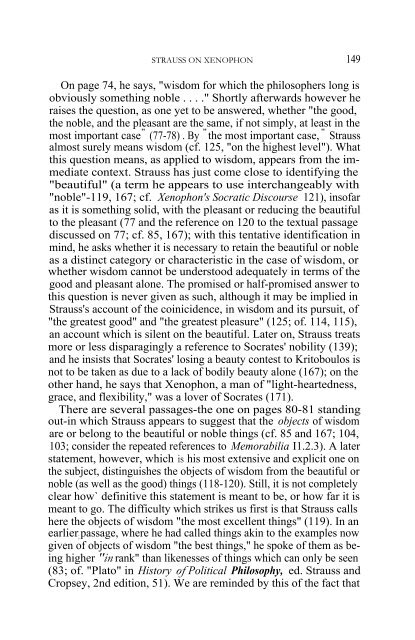Strauss on Xenophon's Socrates Xenophon's Socratic Discourse: An ...
Strauss on Xenophon's Socrates Xenophon's Socratic Discourse: An ...
Strauss on Xenophon's Socrates Xenophon's Socratic Discourse: An ...
You also want an ePaper? Increase the reach of your titles
YUMPU automatically turns print PDFs into web optimized ePapers that Google loves.
STRAUSS ON XENOPHON 149<br />
On page 74, he says, "wisdom for which the philosophers l<strong>on</strong>g is<br />
obviously something noble . . . ." Shortly afterwards however he<br />
raises the questi<strong>on</strong>, as <strong>on</strong>e yet to be answered, whether "the good,<br />
the noble, and the pleasant are the same, if not simply, at least in the<br />
most important case " (77-78) . By " the most important case, " <str<strong>on</strong>g>Strauss</str<strong>on</strong>g><br />
almost surely means wisdom (cf. 125, "<strong>on</strong> the highest level"). What<br />
this questi<strong>on</strong> means, as applied to wisdom, appears from the immediate<br />
c<strong>on</strong>text. <str<strong>on</strong>g>Strauss</str<strong>on</strong>g> has just come close to identifying the<br />
"beautiful" (a term he appears to use interchangeably with<br />
"noble"-119, 167; cf. Xenoph<strong>on</strong>'s <strong>Socratic</strong> <strong>Discourse</strong> 121), insofar<br />
as it is something solid, with the pleasant or reducing the beautiful<br />
to the pleasant (77 and the reference <strong>on</strong> 120 to the textual passage<br />
discussed <strong>on</strong> 77; cf. 85, 167); with this tentative identificati<strong>on</strong> in<br />
mind, he asks whether it is necessary to retain the beautiful or noble<br />
as a distinct category or characteristic in the case of wisdom, or<br />
whether wisdom cannot be understood adequately in terms of the<br />
good and pleasant al<strong>on</strong>e. The promised or half-promised answer to<br />
this questi<strong>on</strong> is never given as such, although it may be implied in<br />
<str<strong>on</strong>g>Strauss</str<strong>on</strong>g>'s account of the coinicidence, in wisdom and its pursuit, of<br />
"the greatest good" and "the greatest pleasure" (125; of. 114, 115),<br />
an account which is silent <strong>on</strong> the beautiful. Later <strong>on</strong>, <str<strong>on</strong>g>Strauss</str<strong>on</strong>g> treats<br />
more or less disparagingly a reference to <strong>Socrates</strong>' nobility (139);<br />
and he insists that <strong>Socrates</strong>' losing a beauty c<strong>on</strong>test to Kritoboulos is<br />
not to be taken as due to a lack of bodily beauty al<strong>on</strong>e (167); <strong>on</strong> the<br />
other hand, he says that Xenoph<strong>on</strong>, a man of "light-heartedness,<br />
grace, and flexibility," was a lover of <strong>Socrates</strong> (171).<br />
There are several passages-the <strong>on</strong>e <strong>on</strong> pages 80-81 standing<br />
out-in which <str<strong>on</strong>g>Strauss</str<strong>on</strong>g> appears to suggest that the objects of wisdom<br />
are or bel<strong>on</strong>g to the beautiful or noble things (cf. 85 and 167; 104,<br />
103; c<strong>on</strong>sider the repeated references to Memorabilia I1.2.3). A later<br />
statement, however, which is his most extensive and explicit <strong>on</strong>e <strong>on</strong><br />
the subject, distinguishes the objects of wisdom from the beautiful or<br />
noble (as well as the good) things (118-120). Still, it is not completely<br />
clear how` definitive this statement is meant to be, or how far it is<br />
meant to go. The difficulty which strikes us first is that <str<strong>on</strong>g>Strauss</str<strong>on</strong>g> calls<br />
here the objects of wisdom "the most excellent things" (119). In an<br />
earlier ;passage, where he had called things akin to the examples now<br />
given of objects of wisdom "the best things," he spoke of them as being<br />
higher "in rank" than likenesses of things which can <strong>on</strong>ly be seen<br />
(83; of. "Plato" in History of Political Philosophy, ed. <str<strong>on</strong>g>Strauss</str<strong>on</strong>g> and<br />
Cropsey, 2nd editi<strong>on</strong>, 51). We are reminded by this of the fact that

















